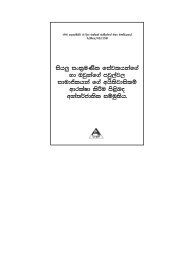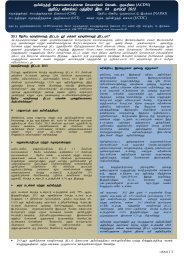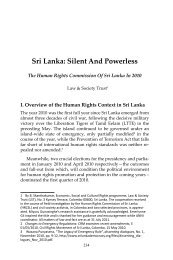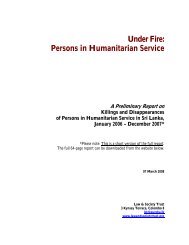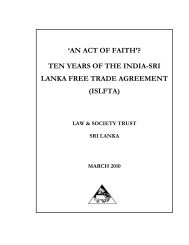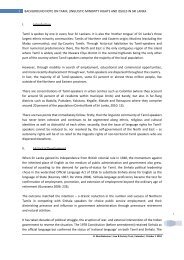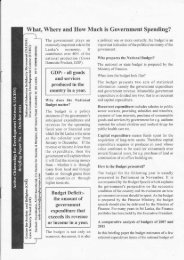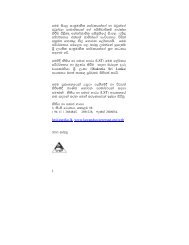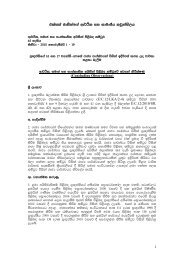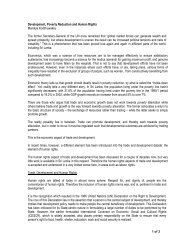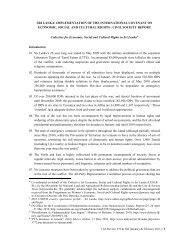sri lanka's commissions of inquiry - Law & Society Trust
sri lanka's commissions of inquiry - Law & Society Trust
sri lanka's commissions of inquiry - Law & Society Trust
You also want an ePaper? Increase the reach of your titles
YUMPU automatically turns print PDFs into web optimized ePapers that Google loves.
BRIEF STATEMENT OF FACTS:<br />
The year 1983 stands out in Sri Lanka’s history for its unprecedented<br />
levels <strong>of</strong> State sanctioned communal violence by the Sinhala<br />
majority against the Tamil minority. July 1983 – or Black July as<br />
it is commonly called – is <strong>of</strong>ten cited as the beginning <strong>of</strong> the war<br />
between the Government <strong>of</strong> Sri Lanka and the Liberation Tigers <strong>of</strong><br />
Tamil Eelam, although many commentators point to earlier dates.<br />
The violence, which had been foreshadowed by communal violence<br />
in 1958 and 1977 and the attack on the Jaffna Public Library in 1981,<br />
forever transformed the nature and identity <strong>of</strong> Sri Lanka and its people.<br />
After almost two decades <strong>of</strong> silence, the government <strong>of</strong> Sri Lanka<br />
appointed a Presidential Commission <strong>of</strong> Inquiry – which it called a<br />
“Truth Commission” – to inquire into the nature, causes and extent<br />
<strong>of</strong> gross violations <strong>of</strong> human rights and the destruction <strong>of</strong> property<br />
between January 1981 and December 1984.<br />
SUMMARY OF FINDINGS:<br />
As is evident in the Report, the Commission was a “truth commission”<br />
in name only. 83 It was neither designed nor intended to be an actual truth<br />
commission, which had, as its fundamental objective, the search for<br />
truth. As such, the Report is weak on findings. Instead, the commission<br />
devotes a significant portion <strong>of</strong> its report to excerpts and quotes from<br />
83.<br />
The Commission did not have, as its primary objective, the search for truth. Further its<br />
mandate was limited, both in terms <strong>of</strong> substance and time. Although extensions were<br />
subsequently given, the Commission originally was given a mere six months to submit its<br />
report. There was no transparent process that gave rise to the Commission. It was not part<br />
<strong>of</strong> a process <strong>of</strong> national reconciliation, although the language <strong>of</strong> reconciliation was used in<br />
both the mandate and the report. Although this was the first time a Sri Lankan commission<br />
<strong>of</strong> <strong>inquiry</strong> was actually named a “truth commission,” the term “truth commission” has been<br />
loosely used at times to refer to some <strong>of</strong> Sri Lanka’s prior <strong>commissions</strong> <strong>of</strong> <strong>inquiry</strong>, namely<br />
the disappearances <strong>commissions</strong>. See, for example, Bulankulame, Indika “The Debates on<br />
Truth Commissions: A Retrospective Healing Process?”, <strong>Law</strong> & <strong>Society</strong> <strong>Trust</strong>, 2004. The<br />
use <strong>of</strong> the term is indicative <strong>of</strong> the term’s currency internationally, and does not adequately<br />
reflect the reality <strong>of</strong> Sri Lanka’s <strong>commissions</strong>. Never has the requisite forethought and<br />
deliberation been devoted to the creation <strong>of</strong> any <strong>of</strong> Sri Lanka’s <strong>commissions</strong> <strong>of</strong> <strong>inquiry</strong>.<br />
Rather, they have been ad hoc and expedient institutional mechanisms that serve practical<br />
political ends while, in some cases, also serving important fact-finding, relief and<br />
rehabilitation functions.<br />
70



